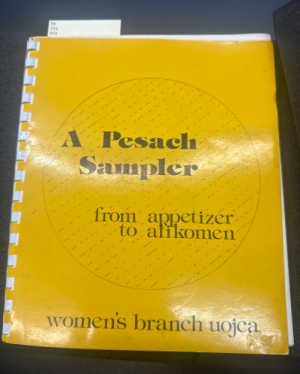A Pesach Sampler: from appetizer to afikomen

A Pesach Sampler: from appetizer to afikomen is a printed cookbook of recipes for the Jewish holiday of Passover. The cookbook was published in the Gregorian year 1979, or the Hebrew year 5739. The book was printed, published, and distributed by the Women’s Branch of the Union of Orthodox Jewish Congregations of America (UOJCA) in New York, New York. The book is currently held in the Kislak Center for Special Collections, Rare Books, and Manuscripts at the University of Pennsylvania, and found its way there by a donation from Martin Kaminer in 2019.
Historical Context
Judaism and Passover
Judaism is the world’s oldest monotheistic religion, which means it is based upon the belief that there is only one God who has established a covenant with them. Jewish practitioners, or Jews, worship in holy places known as synagogues, and their spiritual leaders are called rabbis. The six pointed Star of David is the symbol of Judaism. Today, there are about 14 million Jews worldwide, most of whom live in the United States and Israel. A person is traditionally considered Jewish if his or her mother is Jewish.[1] Many Jewish holidays often include festivities with one’s Jewish family and cooking meals for everyone to enjoy. Of the many Jewish holidays that fall throughout the year, A Pesach Sampler lists recipes specific to the Jewish holiday of Passover, or Pesach in Hebrew. The holiday is typically celebrated sometime in the Gregorian month of April, as the starting date is determined by the Hebrew calendar, on the 15th day of the month of Nisan. Jews gather with family and friends in the evening to read from a book called the Haggadah, which tells the story of Passover and contains through a combination of prayers, rituals, readings, and songs during the dinner meal, collectively referred to as the ritual of the Seder.[2] During the holiday of Passover and during the Seder, Jews are prohibited from eating leavened and fermented grain products due to what the holiday celebrates: the Jewish escape from Egyptian slavery. When the Jews escaped Egypt, they did not have time to let their bread rise before heading into the desert, and as such, their bread baked flat, instead of rising.[3] As such, all food that comply with this dietary restriction and are allowed to be consumed during Passover are said to be Kosher for Passover.
UOJCA
Community Cookbooks
A Pesach Sampler
Material Analysis
Content
Significance
References
- ↑ History.com Editors. “Judaism: Founder, Beliefs & Facts.” History.com, A&E Television Networks, https://www.history.com/topics/religion/judaism.
- ↑ ReformJudaism.org Editors. “Passover: History.” Reform Judaism, https://reformjudaism.org/jewish-holidays/passover/passover-history.
- ↑ Avey, Tori. “What Foods Are Kosher for Passover?” Tori Avey, 16 Mar. 2021, https://toriavey.com/what-foods-are-kosher-for-passover/#:~:text=Leavened%20and%20fermented%20grain%20products,product%20is%20prohibited%20during%20Passover.